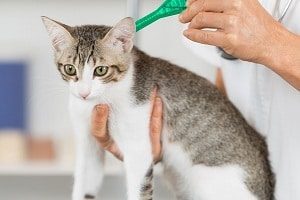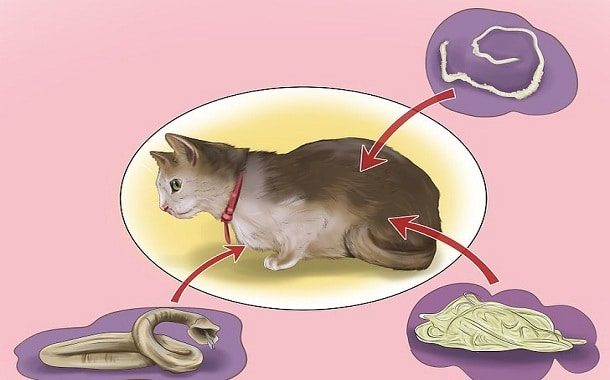How Much Does it Cost to Deworm a Cat?
Last Updated on February 11, 2024
Written by CPA Alec Pow | Content Reviewed by ![]() CFA Alexander Popinker
CFA Alexander Popinker
Keeping your feline friend happy and healthy often requires regular deworming to protect against parasitic worms. But how much does it really cost to keep worms out of your cat’s system?
The price can vary quite a bit based on the type of deworming method, the severity of the infestation, and your veterinary clinic. However, deworming is a fundamental part of preventative care for cats and critical for your pet’s well-being.
Read on to learn what influences the cost of deworming and tips for keeping your cat worm-free on a budget.
How Much Does it Cost to Deworm a Cat?
The total cost to deworm a cat can range from $30 to $300, depending largely on whether you choose an over-the-counter medication or professional veterinary service.
According to MetLife Pet Insurance, regular deworming in kittens or cats can cost over $15 per treatment, and diagnosing worms with a fecal test can cost $30 – $130.
A Reddit discussion points out that the cost of deworming treatment can vary, with an estimated range of $50 to $85 for a vet visit, $50 for a stool test, and no more than $80 for a prescription dewormer.
Community Concern for Cats lists the cost of deworming in the range of $20-$50.
Ontario Veterinary Medical Association reports the cost of deworming medication for cats at $68.
The cost breakdown typically includes the price of deworming medication and potential veterinary exam and fecal testing fees. In general, at-home dewormers are less expensive, while veterinary deworming provides maximum effectiveness but at a higher overall cost.
Veterinary Deworming Costs
Taking your cat to the vet for deworming provides the most thorough treatment but also brings additional fees. A basic veterinary exam may cost $50 to $100 to assess your cat’s health, diagnose potential worm infestations, and prescribe proper medication. Your vet may also recommend running a fecal test for worms at around $25 to $60 per sample. This lab work helps identify the type of parasite so your cat gets the right deworming medication.
Once your vet determines the required deworming treatment, you will need to pay for the actual medication. Prescription oral dewormers acquired through a vet typically range from $20 to $100, depending on the product and number of doses needed to eliminate your cat’s worms. Cats with severe worm infestations or specific types like tapeworms often require prescription dewormers only available through veterinary clinics.
Overall, you can expect to spend $100 to $300 to have your vet diagnose, prescribe, and provide the appropriate deworming treatment for your cat.
Follow-up fecal tests may be recommended around 2 to 4 weeks after initial treatment to confirm the worms have been fully eliminated, adding another $25 to $60 to your total bill.
Deworming Medication Costs
For cats with mild or suspected worm infestations, many pet owners choose to forego the veterinary visit and directly purchase over-the-counter deworming medications. These can provide an effective and less expensive treatment option.
The most readily available OTC cat dewormers are oral medications containing pyrantel pamoate or praziquantel as active ingredients. Typical costs are:
- Pyrantel pamoate tablets or paste: $10 to $20
- Praziquantel tablets: $15 to $30
- Broad spectrum dewormers (pyrantel + praziquantel): $15 to $35
Topical deworming medications formulated as a liquid or paste are also sold OTC for cats. These include:
- Selamectin topical: $40 to $60
- Imidacloprid + moxidectin topical: $30 to $50
Since OTC dewormers for cats do not require a prescription or vet visit, you avoid those additional veterinary fees. However, without an exam or fecal test, it can be difficult to confirm the type or severity of any worm infestation. You may need to purchase multiple rounds of medication to fully eliminate all worms in your cat’s system.
Common Intestinal Worms in Cats
There are three main types of intestinal worms that commonly affect cats:
- Roundworms – Most common in kittens contracted from mother’s milk or rodents. Grow up to 4-6 inches long.
- Hookworms – Transmitted through the skin from contaminated soil. Bite into the intestinal lining.
- Tapeworms – Contracted by ingesting fleas while grooming. Can grow up to 20 inches long.
Knowing the type of worm is key for proper treatment. Broad-spectrum dewormers treat all three, while specific medications target individual worm species.
Severe infestations may require multiple doses stretched over several weeks along with retesting to confirm parasites have been fully eliminated.
Also read about the cost of declawing a cat, cat urinalysis, and Savannah cats.
Factors Affecting the Cost of Deworming a Cat
Several key factors influence how much you will spend to deworm your feline companion:
- Location – Veterinary service and medication prices vary geographically. Urban clinics tend to be more expensive.
- Worm type – Tapeworms often require prescription medication only available from a vet clinic.
- Infestation severity – More severe cases need extended treatment over weeks/months.
- Vet vs OTC – At home dewormers have lower upfront costs but may require repeat treatments.
- Fecal tests – Lab work helps diagnose but adds $25-$60 per sample tested.
- Insurance – Having pet insurance can offset deworming costs but comes with monthly premiums.
How to Save Money on Deworming Your Cat
 Don’t let the costs deter you from properly deworming your furry friend. There are ways to control expenses while keeping your cat worm-free:
Don’t let the costs deter you from properly deworming your furry friend. There are ways to control expenses while keeping your cat worm-free:
- Stick to regular preventative deworming every 3-6 months.
- Research options to find the lowest cost vet in your area.
- Buy OTC whenever appropriate to avoid vet markup.
- Compare medication prices online before purchasing.
- Consider enrolling in pet insurance to cover future deworming costs.
- Buy generic equivalents if available at your pharmacy.
- Only do fecal tests when absolutely necessary.
Final Words
Regular deworming is fundamental for your cat’s health and well-being. While costs can add up, focusing on prevention and cost-saving measures can help keep your cat worm-free without breaking the bank!
Frequently Asked Questions
Can I Deworm My Cat Myself?
Yes, you can deworm your cat at home using over-the-counter medications – but there are some important caveats. Here’s what you need to know about DIY cat deworming:
- Stick to OTC dewormers containing praziquantel and/or pyrantel pamoate, the active ingredients proven safe and effective for cats.
- Without a vet consult, you won’t know what type of worms your cat has or the severity of the infestation. OTC meds may not fully eliminate all worm types.
- Carefully follow all label directions for proper dosage and administration. Never give medications meant for dogs.
- Monitor your cat closely after deworming for potential side effects like vomiting or diarrhea indicating an overdose.
- You may need to deworm multiple times over weeks or months to fully clear an infestation. Retesting stool samples can confirm efficacy.
- For severe, chronic, or parasitic infections, visit a vet for prescription strength medication and professional guidance on an effective treatment regimen.
While deworming your cat at home can save on veterinary costs, it is very important to follow directions and monitor for effectiveness closely. Consult your vet if you have any concerns about safely and effectively deworming your cat on your own.
Can You Touch a Cat With Worms?
It’s generally safe to touch and pet a cat with worms like roundworms, hookworms, and tapeworms. Here’s what cat owners should know:
- Most cat worms are not transmittable to humans and pose minimal zoonotic risk from simple contact or petting.
- Practicing good hygiene like hand washing after handling cat feces containing worm eggs reduces risk even further.
- Internal worms shed microscopic eggs passed in the feces which must be accidentally ingested to cause human infection.
- Certain worms like hookworms can rarely be transmitted by skin contact with contaminated soil or sand that may irritate the skin.
- Fleaborne tapeworms have the highest potential transmission from ingesting infected fleas while grooming the cat.
- Kittens and cats with weakened immune systems may have larger worm burdens increasing shedding of eggs.
While internal cat worms themselves don’t pose significant health risks to humans, its smart to provide prompt parasite treatment and follow basic hygiene precautions. As always, consult your vet for guidance on your pet’s worm status and any specific risks in your situation.
Can Humans Get Worms From Stray Cats?
It’s unlikely for humans to get intestinal worm infections directly from stray cats. However, there are some considerations for potential transmission:
- Stray cats have higher rates of parasites like roundworms, hookworms, and tapeworms from lack of preventative treatments.
- Worm eggs must still be accidentally ingested from contaminated environments to cause human infection – not from simply petting strays.
- Children are at higher risk due to increased environmental exposure and hand-to-mouth behaviors. Teach proper hygiene.
- Hookworm larvae can rarely penetrate bare skin contacting contaminated soil. Wear shoes around stray populate areas.


Leave a Reply
Want to join the discussion?Feel free to contribute!